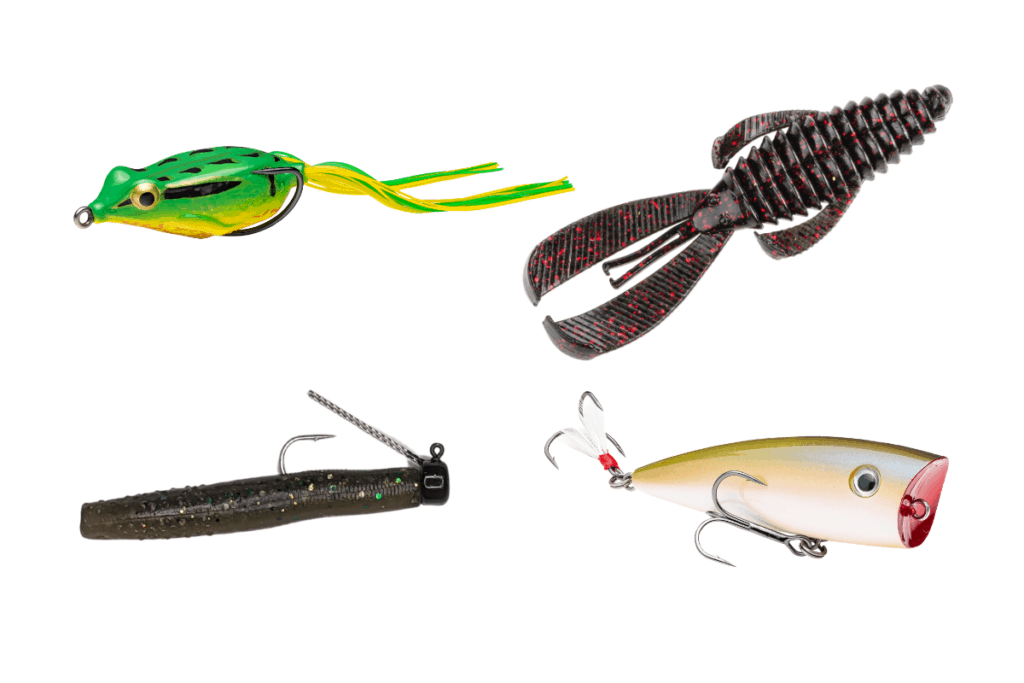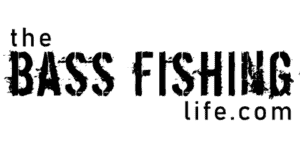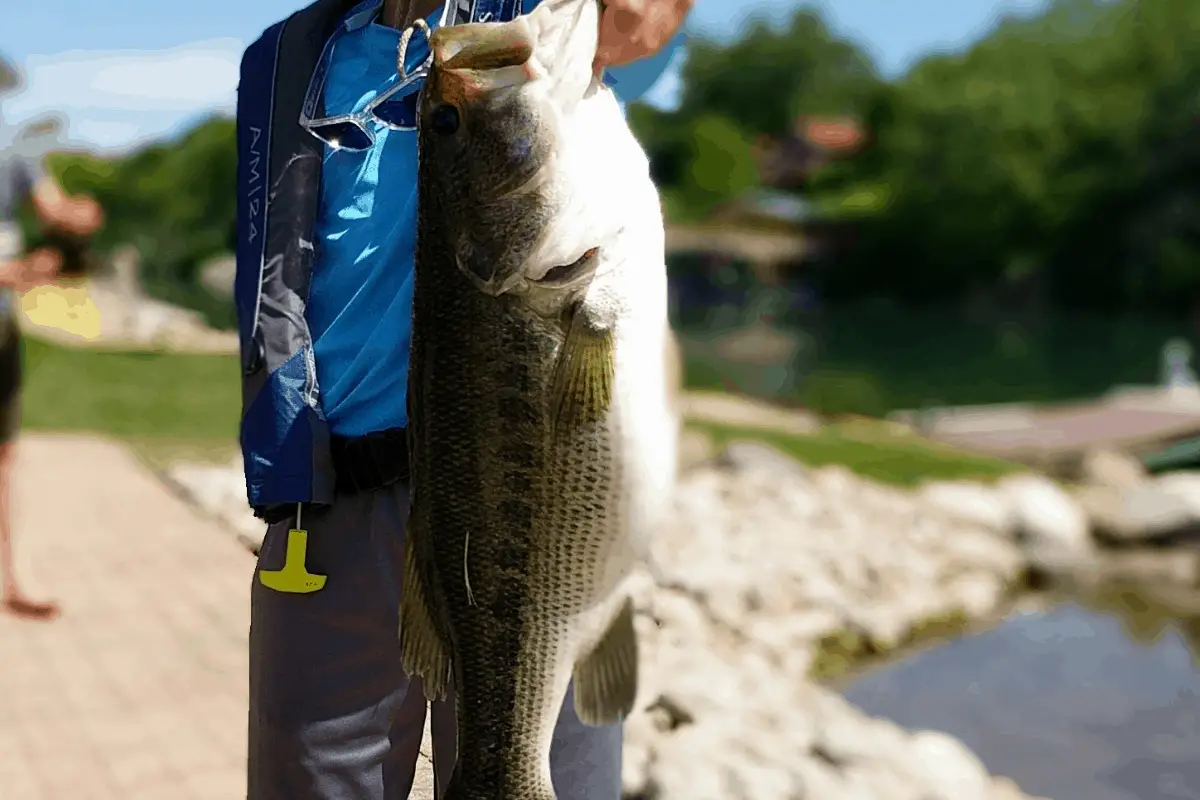There are thousands of anglers that call the shoreline their home. Even if you have a tricked out bass boat, there are times where bank angling is the only option available. These effective shore angling techniques will have you hooking monster bass quickly.
To catch big largemouth from the shore, you need to use bank fishing to your advantage. Be stealthy and keep your shadow from casting onto the water and use a long rod to thoroughly work cover, like brush piles, that anglers cannot reach from a boat.
In this article, I will discuss all the benefits of fishing for largemouth from the shoreline. You can catch some real trophies that others cannot get to.
Mindset for Shore Angling
Fishing from the shore often gets a bad rap. That is unfortunate.
If, as anglers, we change our mindset about shore fishing, we can use the distinct advantages to catch fish that others can never reach from a boat.
Stealth
It is almost impossible to be stealthy from a boat. Yes, we can be quiet. The trolling motor can be ultra silent, and our casts can be perfect, but the bass are still alerted to our presence sooner than we think.
A well-known Bassmaster Elite Series angler, Steve Kennedy, uses a much smaller boat than other competitors for this very reason. He firmly believes that the water displacement from these large 21’ bass boats alerts fish to our presence – even if anglers silently slip into position.
The displaced water, pushed by the hull of the boat, moves in directions that are unnatural to the normal flow in a particular lake or river.
So even if we take all the precautions necessary to be stealthy in a boat, it is almost impossible to not let the fish know we are there.
Shore anglers have a distinct advantage here.
Shadows
When fishing from the shore, be wary of the shadow that you cast. Fish are cognitive about what is above them and shadows often mean predators are near. Shore birds take their fair share of fish, including bass, from standing above them.
Casting a shadow is a sure way to alert bass to your presence.
If the sun is in front of you, then this will not be a problem. Whenever possible, it is best to fish with the sun in your face. Choose a shoreline that puts you in the best position to make this a choice.
If it is impossible to keep the sun in your face, then do your best to stand in a position that will cast your shadow away from the cover you are fishing. This may not always be easy to do, but it is worth the effort to keep that 5lb’er down there unaware of your plans.
Approach
Fishing from the shore is a strange thing. When we are in a boat, 99% of our casts are directed towards the shoreline. When we fish from the bank, we often do just the opposite and cast towards the center of the lake or river.
Our first target with our lures should always be at some sort of cover that is close to shore.
Look for a lone stump, a pile of brush, a pocket of thick vegetation, a dock – anything close to shore that is likely to hold a bass. Hit those high percentage areas first before casting out into the middle.
Equipment for Shore Fishing
When shore fishing, I prefer two rods. One will be for fishing thick, nasty, cover. The other rod will be used for making longer presentations either out into the body of water, or parallel along the shoreline.
For my first setup, I love to use a long rod. Something in that 7’6” to 8’ range is ideal. A long rod allows me to reach out and silently dip that lure into places that are difficult to target from a boat.
As far as the power rating on the rod, if I am specifically targeting thick gnarly stuff, I prefer a medium heavy or heavy action. When a bass hits that lure, I do not want it to turn and get buried in that cover. With a heavier rod rating, I can keep the fish from turning its head and pull it out of the cover avoiding a hangup.
On this heavy cover fishing setup I will spool on 50lb braid. The gear ratio of the reel doesn’t matter much since this is not a cast-and-wind approach.
The second rod and reel I bring along will be focused on making long casts to cover and structure I cannot necessarily see.
I may have another baitcast setup, or if the water is clear, I may bring along a spinning rod and reel. Your personal preference is fine for this second rod.
The power rating is dependent on what you like to do most of the time when casting out. If you prefer a bottom bumping setup, like a jig, Ned Rig, or Texas Rig, a medium-heavy rod is the better choice.
If you are going to throw some topwaters like a popper, small crankbaits or chatterbaits – then a medium action is preferable.

Excellent Shore Fishing Lures
When fishing from the shore, we are limited in the amount of tackle we can carry. I don’t know about you, but this is always a huge problem for me, so I narrow it down to the following selection:
- Topwater frog
- Shallow running hard jerkbait
- Ned Rig
- A Texas Rigged soft plastic (usually a creature bait)
- Topwater popper
- A soft plastic worm
For the soft plastics, I carry a bag of each. For the hardbaits and frog, I will keep a couple with me. There are many other great choices, but I have found these are consistent fish catchers and work in most any body of water and situation.
Weight
This is the single biggest issue shore anglers have. If the weight we are using is too heavy, the day will be ruined from constant hang-ups and broken line.
Going lighter is always better when shore fishing. My general rule is cut everything in half from what I would normally throw from a boat. If a ¼ oz worm weight is perfect from the boat, a ⅛ oz is ideal from the shore.
I think you will find the day is far less frustrating when going lighter.
The Presentation
Another huge advantage to shore angling is the ability to fish slowly. When fishing from a boat, often the wind, current, or wakes will push us out of position and we need to reel in our lure. Sometimes sooner than we wanted to.
Shore anglers do not have this problem.
A wise bank angler can let that bait soak and fish it painstakingly slow. This more natural presentation and attention to retrieval speed will directly correlate with more bites and larger fish.
It is easy to fish too fast. Use shoreline angling to your advantage and keep that bait moving at a natural pace and leave it in the strike zone longer. You’ll be glad you did.
Parallel the Bank
Paralleling is one of the best tactics I know of – even from a boat.
Cast down the bank, parallel to the shoreline, and retrieve your lure that way. This approach keeps your lure in a high percentage area which translates to more bites. I always cast parallel, both directions, before I ever make a cast out towards the middle.
Be Thorough
This is probably the single biggest advantage a shore angler has. After stealthily approaching a brush pile, a shore bass angler, can silently dip that soft plastic into every crack, crevice, and opening.
An angler from a boat may make ten good presentations to a brush pile. When fishing from the bank, you can make twice that without making a ripple in the water.
The biggest bass often bury themselves into the thickest cover. Make that your first target area and work out from there. Take your time. Hit everything you can with stealth.
And hold on, because you are going to catch some toads!
Final Thoughts
It is possible, and probable, to have some amazing days catching largemouth from the shore.
I spent many hours with an angling mentor of mine that pulled trophy-after-trophy from the water and he rarely used a boat. His preferred method was angling from shore.
Travel light, pack a couple of rods and the lures that I mentioned above, and you will be ready.
Keep your mindset positive. Shore anglers have distinct advantages over those fishing in a boat. To be successful, use those advantages and have a great day at the lake.
Besides, you don’t have to wait in line at the boat ramp.
Tight lines, be safe out there and don’t forget to encourage someone today. You never know how you might just change their life!

